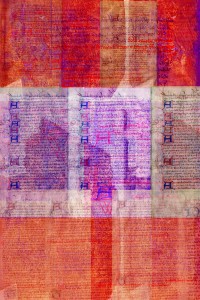Remix the Manuscript started, fittingly, as a riff on Mark Amerika’s remixthebook.com. On this interactive digital platform, artists, philosophers, and technologists played with Amerika’s source material to “remix” the very idea of the book as a tangible form. The 3D book was actually sitting on my desk while I was brainstorming project names, the words on the spine coming suddenly into focus. In my subsequent correspondence with Amerika, we both observed how new media challenges and even collapses the distinction between analysis and art. Through Remix the Manuscript, I also aim to address a paradigmatic distinction—between documents and databases—by treating a document like an expandable database.
Of course, there are many calls for remix across digital space, with varying degrees of politics and play (as my colleague Kirstyn Leuner quickly reminded me). Often, they suggest that vibrant futures require severing ties with the past. But the word itself keeps us tethered to repetition (re) and to inherited forms (things already available to be thrown into the mix). Remix is therefore an elegant guiding principle for a deep history of the present that glimpses the future.
I wasn’t very far into my exploration of remixthebook.com when I came to Whittney Trettien’s post Remixing History. Trettien locates an origin for the word in Thomas Lodge’s 1614 English translation of Seneca’s Latin Epsitle LXXI (referenced as the first mention of remix in the Oxford English Dictionary). Lodge refers to the “remixing” of the soul as the path to greater good. The English word itself is something a remix of Latin: “the word ‘remix’ is an Anglicization of remiscebitur, invented to evoke the scholarly elitism of Latinate constructions” (Trettien). The tantalizingly distant date of 1614 makes a medievalist wonder about deeper legacies of language.
I turned to the trusty Middle English Dictionary to see what more could be thought about the theory of history through mixology. The MED tells me that “mix” is basically dirty stuff (filth, dung, foul, wicked, vile). Distasteful things, not attractive blends. The OED deems this medieval mess “obsolete,” while mixing actions can indeed be found in the fifteenth century. Remix now, dictionaries to hand, gathers these disparate moments and contradictions. My favorite mix, which we can deploy outside of its bounded use at the turn of the twentieth century, must be the “now rare” meaning, “the accidental running together of unconnected portions of text” (OED).
Mixology is another new philology.
* OED links will only work with a subscription; MED is open access.
Remix of Brut folios by Ben Patrick. More on this artistic collaboration later!

